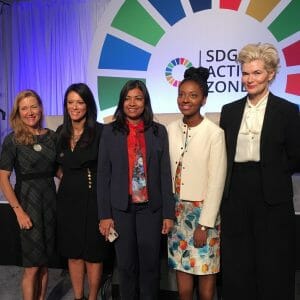
“Women’s equal economic participation in advanced economies can increase GDP by 10% and in developed countries by as much as 30%.” Egypt’s Minister for Tourism and former IMF official Her Excellency Rania Al-Mashat opened the high-level panel “When Women Lead” at the United Nations SDG Action Zone on September 25 by emphasizing the positive macro-economic impact of women’s economic engagement. “GDP growth leads to productivity growth and when productivity grows pay increases among both men and women. Egypt was the first country in 2017 to launch a national strategy for women for 2030,” Al-Mashat pointed out.
The “When Women Lead” panel was convened by WE Empower UN SDG Challenge partner the Women Political Leaders Forum. In addition to Minister Rania Al-Mashat, Michelle Harrison (Global CEO, Public Division Kantar Public), Raquel Helen Silva (Girls20 Ambassador) and Rozaina Adam (Member of Parliament of Maldives) joined as panelists, moderated by Amanda Ellis (Executive Director, Hawaii & Asia-Pacific, ASU Julie Ann Wrigley Global Institute of Sustainability). The session covered a range of topics on gender equality in relation to public policy by leaders who are fighting against harmful regulations, policies and discriminatory social behaviors. In no country in the world has gender equality yet been achieved.
Kantar’s Dr. Harrison stated that “the most important thing we can do is create the evidence base, such as the Reykjavik Index put forth by the WPP which measures attitudes to women in leadership. Disappointingly, the Reykjavik Index has helped us to understand that the majority the world over still do not think women are fit to lead.” Knowing this helps us to understand the problem and measure progress, and consistently creating more of an evidence base where women in public policy are concerned will help us do the same with similar issues.
Maldives MP Rozaina Adam asserts that institutions don’t do enough to support women who are trying to participate in either public life or the private sector. Currently only 2% of UN member countries have gender equality in Parliamentary representation. Adequate financing is often not provided to women, and when this road bump meets with many others such as parental leave and availability of childcare, the barriers can just be too great.
As a Girls20 Ambassador, Raquel Helen Silva expands on these ideas by bringing in a youthful perspective on these issues. She states that we can “increase the magnitude of the global conversation through hashtags and storytelling” and that youth has a lot to offer. Youth can also create power in words by insisting that language matters when it comes to addressing the previous key points. This means really interrogating what we mean when we say things like female leadership and equal representation.
These innovative women represented in this “When Women Lead” panel had several key points that demonstrated the powerful benefits of equal representation in institutions, but they always came back to this integral fact: When women have equal representation in institutions and government, not only do economies benefit, but the institutions and individuals that participate in those economies benefit as well. In addition to women being macro-critical, the diversity dividend is well documented. Gender equality is good for everyone!
This article was written by WE Empower Intern Jordan Leiter, whose ASU degree focuses on sustainability as it intersects with gender equality.